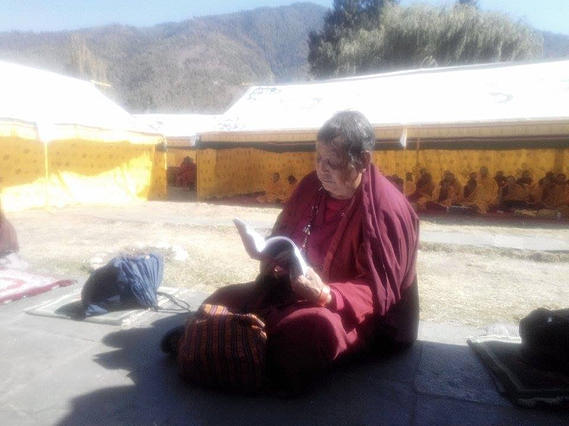By Dechen Choden
Most of the elderly population spend their days chanting prayers, circumambulating the temples and prostrating, as they are more meticulous in their religious practices. The majority of the people in Bhutan follow Buddhism and hence, it plays a vital role in the lives of most people, especially those who belong to older generations.
In Bhutan, as elsewhere, elderly people have traditionally been held in high esteem for their wisdom, their role as head of the family and as an effective mediator in conflict resolutions. They are placed higher in society and given due respect. This practice is evident in most communities and a large number of senior citizens live a dignified and satisfying life. However, due to modernization, urbanization and exposure to western countries the aged members of society have become vulnerable due to altered family structures, an increase in migration, and changes in living arrangements. This has become a grave concern to many decision-makers and the elderly cohort of population of Bhutan.
With the increasing migration to urban areas, elderly people are often left behind in the villages to defend themselves. In urban areas, the extended family system is more diluted and the nuclear family norm is becoming increasingly visible. This trend disrupts the age-old cohesive family structure leading to the exclusion of the elderly. This way they become more vulnerable and often have to depend on others for their livelihood. The journalist Gyembo Namgyel said, “although we live in a compassionate society with GNH (Gross National Happiness) as the ultimate goal based on the principles of equity and justice, there is still a small section of society that continues to be left behind, needing more support than the rest. In most cases, elderly people, even in the villages, will continue to be respected and taken care of, but in extreme cases, a legal basis implemented in the local administration could be the only answer to give some dignity to the weaker section of society when they most need it.”
There are numerous civil society and non-governmental organizations working for the welfare of senior citizens in most of the countries in the world including India. The 2007 Maintenance and Welfare of Parents and Senior Citizens Act of India provides supplies for the welfare and maintenance of the elderly. This includes food delivery, shelter, clothing and medical treatment. However, this is not the case in Bhutan. There are a few organizations working on some projects to benefit the elderly population, but there aren’t any organizations which work for the protection and security of senior citizens in Bhutan.
People are living longer with new medications and surgical techniques, nevertheless, health problems among the elderly are very common. Lots of our elders are coping at least with one illness. According to HelpAge India, some of the problems faced by the elderly include failing health, economic insecurity, isolation, neglect, abuse, fear, boredom or idleness, lowered self-esteem, loss of control and lack of preparedness for old age.
When I was interning with Dignity Foundation during my first year, we conducted a survey on Elder Abuse and it was shocking to see how they were abused by their close family members like their own children, relatives or care takers. Most of the cases were of neglect and emotional abuse, followed by material and medical abuse. Most of them were not aware of the maintenance and welfare act or their rights.
Bhutan is a society where our values are intrinsic in nature, making us who we are. Respecting and taking care of the elderly is one of the most important aspects of culture. These values are inculcated within us at home and through schools, making us invariably Bhutanese. Most of us don’t believe in keeping our parents in an old age home, nor do we think our elderly citizens are neglected and rendered homeless, but the number of the homeless senior citizens is increasing. Moreover, we do not have old age homes to address this issue, however, some monasteries and organizations are providing food and shelter for these needy senior citizens. Since the problem of senior citizens here in Bhutan is a new phenomenon, there are not many planned programmes and policies in place for them.
While talking to some people, there was a mixed response regarding the need to establish old age homes in Bhutan. Those in favor of old age homes said there is an urgent need for old age homes because of the increase in the number of homeless senior citizens and their plights. For this it is essential to address the issue of abuse, although such cases have not reached an alarming number yet. Having old age homes would help provide sufficient maintenance, ensure financial support, dignity and safeguard the vulnerable elderly citizens.
On the other hand, some said that Bhutanese people are compassionate beings who can take care of the elderly population and their country has not reached a point where there is a need for old age homes. Bhutan is still a caring society where everyone is guaranteed a decent living and respecting parents is one of the most important aspects of Buddhism.
The truth is that things seem to be changing.

Comments are closed.